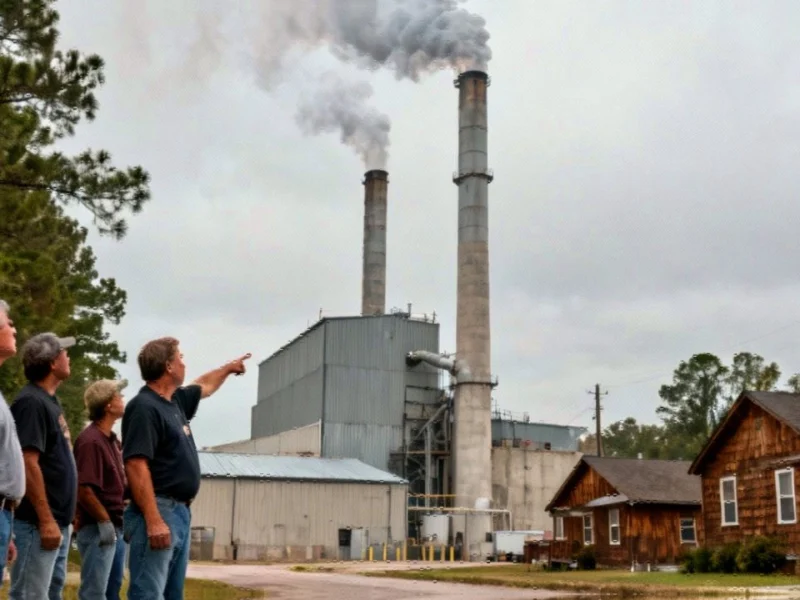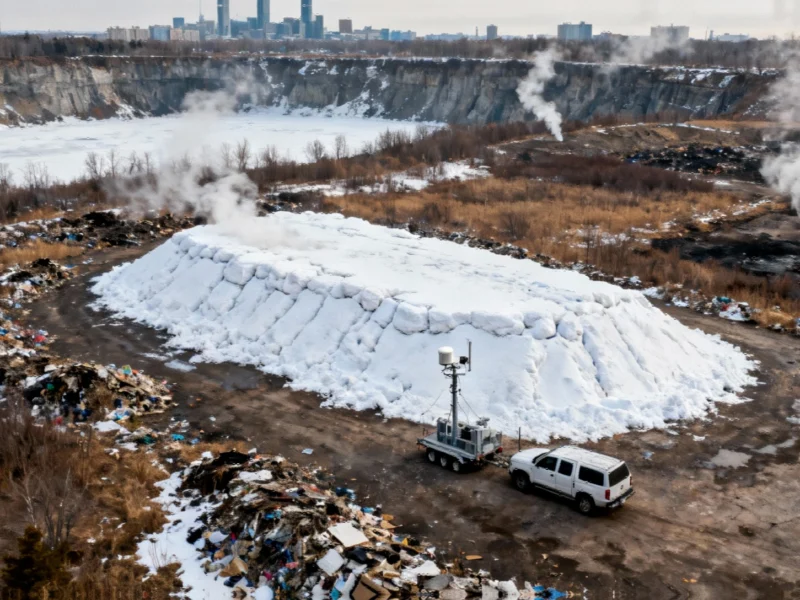Environmental Justice Battle Intensifies Against Biomass Corporation
Residents of Gloster, Mississippi have launched a significant legal challenge against Drax Biomass, a UK-owned energy corporation, following controversial regulatory approval that permits increased hazardous emissions from the company’s local wood pellet production facility. The lawsuit represents a growing conflict between community health concerns and international energy interests.
The predominantly Black, low-income community of approximately 900 people alleges that the facility has already caused serious health problems since its establishment a decade ago, with residents reporting persistent respiratory issues, dizziness, headaches, and other ailments directly attributed to plant emissions. The legal action seeks to hold the FTSE 250 company accountable for what plaintiffs describe as the unlawful exposure of locals to dangerous levels of chemicals and pollutants.
Regulatory Reversal Sparks Community Outrage
In a surprising turnaround, the Mississippi Department of Environmental Quality (MDEQ) permit board granted Drax permission to become a “major source” of air pollution this week, reversing its April decision that had denied the emissions increase. The approval came despite the facility’s history of environmental violations, including a $250,000 fine last year for releasing over 50% more harmful pollutants than permitted and a $2.5 million penalty in 2020 for underestimating volatile organic compound outputs over several years.
Letitia Johnson, an attorney at Singleton Schreiber representing the community, stated: “This case is about holding a multibillion-dollar foreign corporation accountable for poisoning a small Mississippi community.” The lawsuit claims pollutants from the plant have coated homes and increased cancer and respiratory disease risks among residents.
International Subsidy Controversy
The Gloster facility converts trees from southern US states into wood pellets that are shipped to Drax’s massive power station in Selby, North Yorkshire, England. According to thinktank Ember, Drax is projected to receive over £10 billion in UK renewable energy subsidies between 2012 and 2027 for its biomass generation. This substantial financial support continues despite ongoing scrutiny from environmental groups and climate scientists who question the sustainability of the company’s wood sourcing practices.
The controversy extends beyond environmental concerns to encompass broader industry developments in corporate accountability. Drax previously faced a £25 million ($33 million) fine for supplying inaccurate biomass sourcing data and is currently under investigation by the UK’s Financial Conduct Authority. UK lawmakers are simultaneously reviewing the substantial renewable energy subsidies directed to the North Yorkshire plant.
Community Health in Crisis
Residents describe living in constant exposure to plant emissions. Jimmy Brown, who lives less than a mile from the facility, told conservation outlet Mongabay: “You got dust falling all night. You got constant noise from the plant. You got odor. You got truck traffic [carrying tons of trees and chipped wood] all day, every day. That’s what a lot of people don’t understand. It’s nonstop.”
In a letter to Mississippi Governor Tate Reeves and the MDEQ permit board, 85 advocacy organizations highlighted the severity of the situation: “From young children with asthma who are unable to play outside, to elderly residents reliant on costly breathing treatments, it is clear that Gloster is a community in crisis.” The organizations noted that “those who can afford to leave are doing so, while those who remain are left to suffer worsening health.”
Broader Corporate Accountability Questions
The case against Drax emerges amid increasing global scrutiny of corporate environmental practices. Similar to how recent technology disputes have revealed complex corporate structures, the Drax situation demonstrates how international business operations can impact local communities. The UK government has faced accusations of funding “environmental racism” through its subsidy program that benefits Drax operations affecting minority communities in Mississippi.
The controversy also intersects with wider market trends in international trade and environmental regulation. As global economic relationships evolve, cases like the Drax lawsuit highlight the growing tension between corporate interests and community welfare.
Industry Response and Future Implications
Following the permit approval, a Drax spokesperson expressed satisfaction that “the permit board has listened to the clear recommendations of its own technical staff, and the voices of Gloster community leaders, local businesses and a large number of our neighbors in Gloster.” Drax Biomass acknowledged awareness of the lawsuit but declined to comment on ongoing legal matters, instead emphasizing its commitment to being “a good neighbour in our communities and to supporting their wellbeing and prosperity.”
The case’s outcome could have significant implications for related innovations in environmental regulation and corporate accountability worldwide. As international organizations monitor such developments, the Drax situation exemplifies how local environmental justice issues increasingly resonate across global supply chains and energy markets.
The legal battle unfolds against a backdrop of increasing scrutiny of corporate environmental practices, similar to how industry developments in technology face growing regulatory attention. The case represents a critical test of how environmental regulations protect vulnerable communities against powerful corporate interests in an increasingly interconnected global economy.
This article aggregates information from publicly available sources. All trademarks and copyrights belong to their respective owners.

